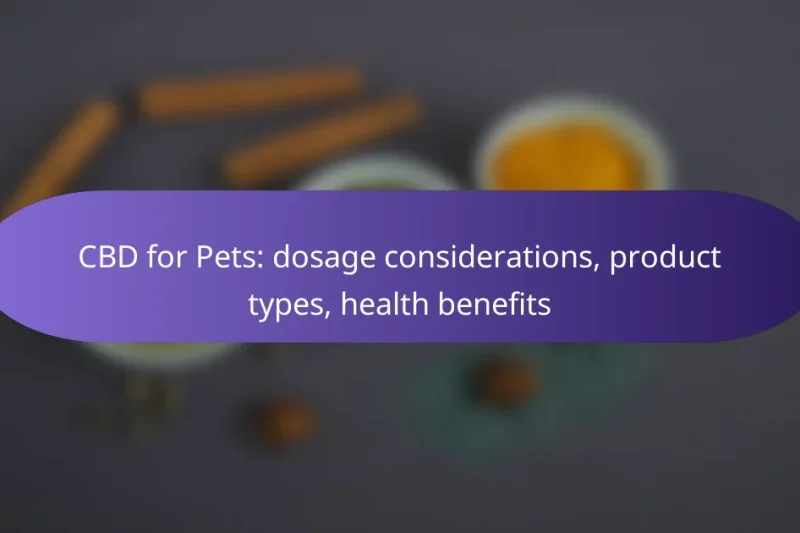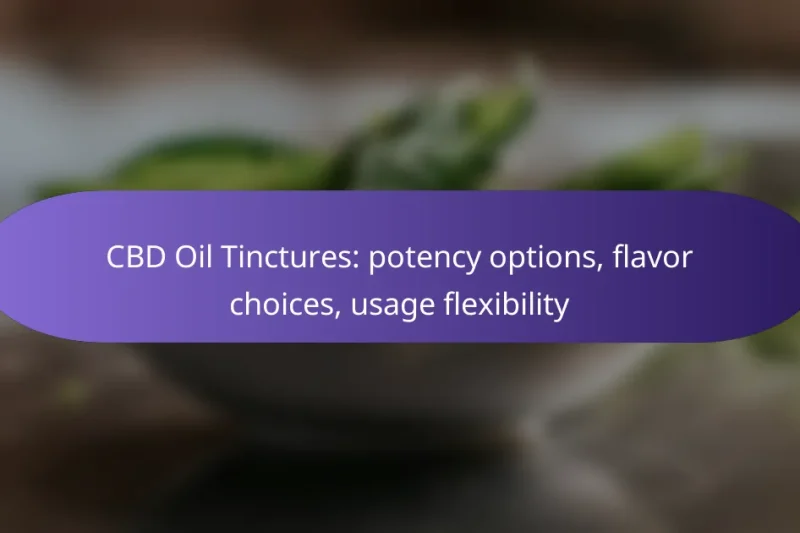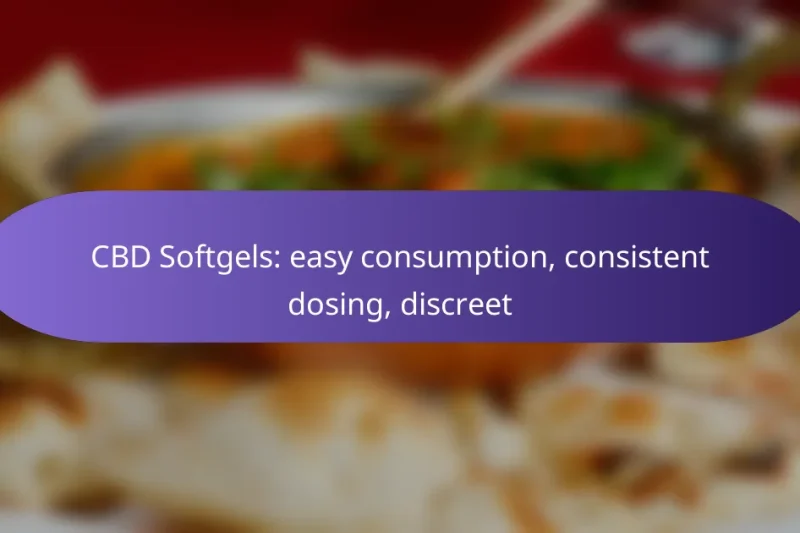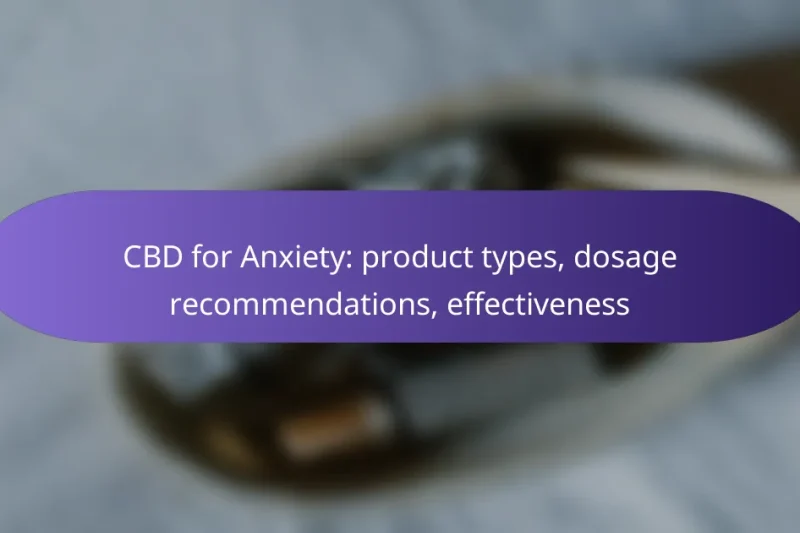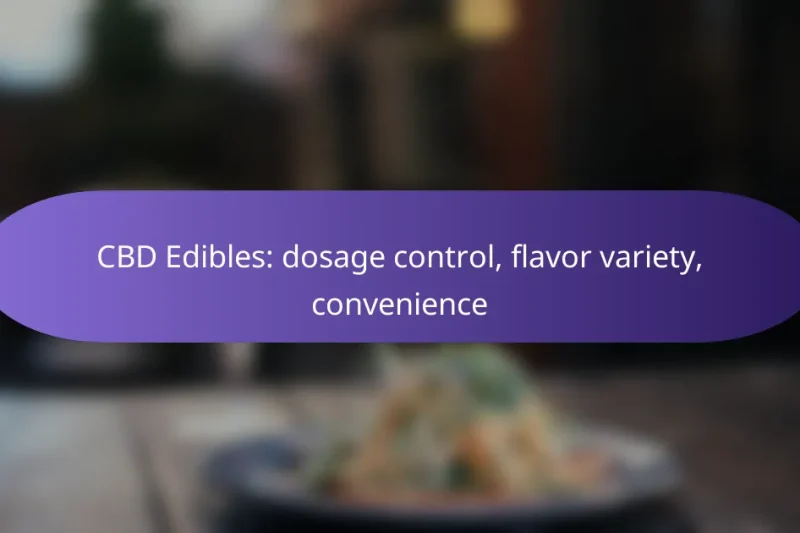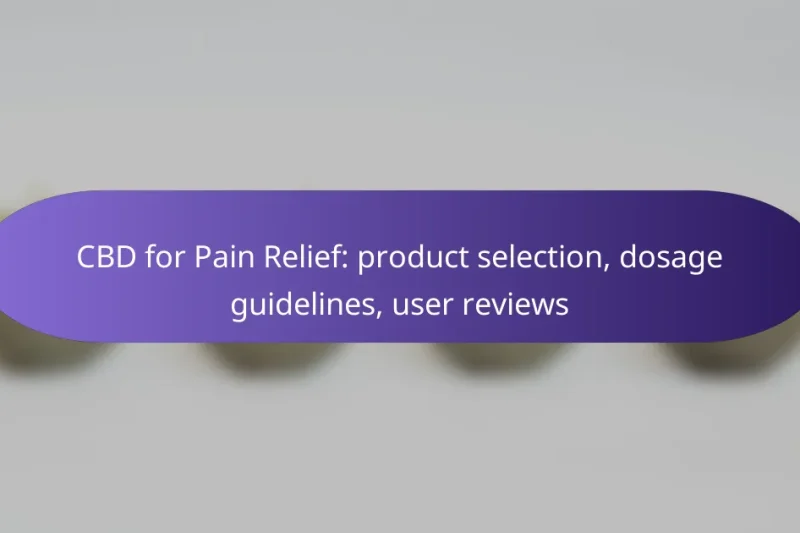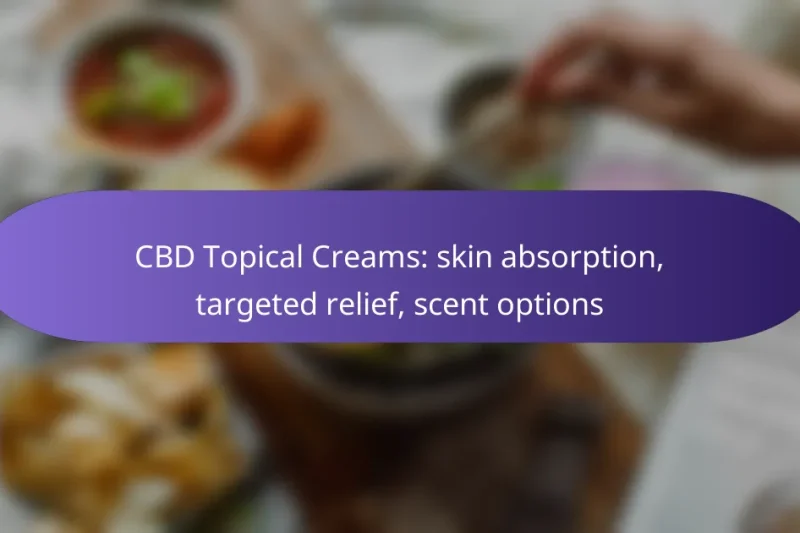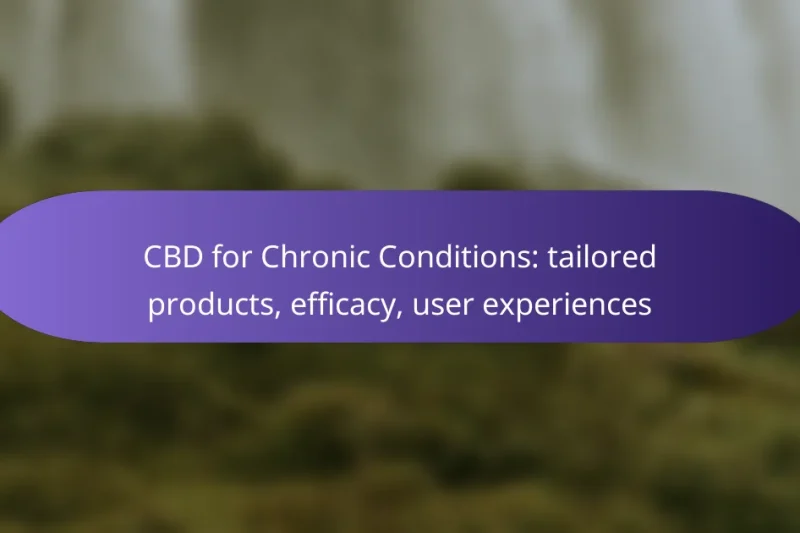CBD products for pets, including oils, treats, and topicals, can provide significant health benefits such as … CBD for Pets: dosage considerations, product types, health benefitsRead more
Choosing the Right CBD Product for You
Choosing the right CBD product can greatly enhance your experience and effectiveness in achieving your health goals. With a variety of options available, including oils, gummies, and topicals, it’s essential to consider your personal preferences, desired potency, and the importance of third-party lab testing. By understanding the differences in formulations and delivery methods, you can make an informed decision that aligns with your specific needs.
CBD Flower: strain variety, smoking experience, potency levels
CBD flower offers a diverse range of strains, each with distinct effects, flavors, and potency levels, … CBD Flower: strain variety, smoking experience, potency levelsRead more
CBD Oil Tinctures: potency options, flavor choices, usage flexibility
CBD oil tinctures provide a range of potency options to accommodate individual needs, from mild effects … CBD Oil Tinctures: potency options, flavor choices, usage flexibilityRead more
CBD Softgels: easy consumption, consistent dosing, discreet
CBD softgels provide a convenient and straightforward method for incorporating cannabidiol into your daily routine. With … CBD Softgels: easy consumption, consistent dosing, discreetRead more
CBD for Anxiety: product types, dosage recommendations, effectiveness
CBD has gained popularity as a potential remedy for anxiety, interacting with the body’s endocannabinoid system … CBD for Anxiety: product types, dosage recommendations, effectivenessRead more
CBD Edibles: dosage control, flavor variety, convenience
CBD edibles provide a convenient and enjoyable way to incorporate cannabidiol into your daily routine, offering … CBD Edibles: dosage control, flavor variety, convenienceRead more
CBD for Pain Relief: product selection, dosage guidelines, user reviews
CBD has emerged as a popular option for pain relief, with various products such as oils, … CBD for Pain Relief: product selection, dosage guidelines, user reviewsRead more
CBD Lip Balm: soothing properties, moisturizing, portable
CBD lip balm is a convenient skincare product that combines the soothing properties of cannabidiol with … CBD Lip Balm: soothing properties, moisturizing, portableRead more
CBD Topical Creams: skin absorption, targeted relief, scent options
CBD topical creams provide targeted relief by allowing cannabinoids to penetrate the skin and interact with … CBD Topical Creams: skin absorption, targeted relief, scent optionsRead more
CBD for Chronic Conditions: tailored products, efficacy, user experiences
CBD has emerged as a potential ally for those managing chronic conditions, with a variety of … CBD for Chronic Conditions: tailored products, efficacy, user experiencesRead more
What are the best CBD products for beginners?
For beginners, the best CBD products are those that are easy to use and offer clear dosing options. Full-spectrum CBD oil, gummies, capsules, topical creams, and tinctures are popular choices that cater to different preferences and needs.
Full-spectrum CBD oil
Full-spectrum CBD oil contains a range of cannabinoids, including trace amounts of THC, which can enhance the overall effects due to the entourage effect. This product is typically taken sublingually for quick absorption, making it a good option for those seeking rapid relief.
When choosing full-spectrum oil, consider starting with a low concentration, such as 5-10 mg per dose, and gradually increasing as needed. Be aware of local regulations regarding THC content, as some areas have strict limits.
CBD gummies
CBD gummies are a convenient and tasty way to consume CBD, making them ideal for beginners who may be hesitant about oils or tinctures. They come in various flavors and dosages, usually ranging from 5-25 mg of CBD per gummy.
When selecting gummies, check the ingredient list for added sugars or artificial flavors. Start with one gummy and wait for a couple of hours to gauge its effects before taking more.
CBD capsules
CBD capsules offer a precise dosage, making them an excellent choice for those who prefer a straightforward approach. Each capsule typically contains between 10-25 mg of CBD, allowing for easy tracking of intake.
Capsules take longer to take effect compared to oils or gummies, as they must pass through the digestive system. Consider taking them with food to enhance absorption and avoid potential stomach discomfort.
Topical CBD creams
Topical CBD creams are designed for localized relief, making them suitable for targeting specific areas of discomfort, such as sore muscles or joint pain. These products do not enter the bloodstream, so they are ideal for those who want to avoid systemic effects.
When using topical creams, apply a small amount to the affected area and massage it in. Start with a lower concentration and increase as needed based on your experience and results.
CBD tinctures
CBD tinctures are concentrated extracts that can be taken sublingually or added to food and drinks. They typically come in dropper bottles, allowing for flexible dosing, which is helpful for beginners experimenting with their ideal amount.
Look for tinctures with clear labeling regarding CBD concentration, usually ranging from 10-30 mg per serving. Start with a small dose and gradually adjust based on your individual response to the product.
How to choose the right CBD product for your needs?
Choosing the right CBD product involves understanding your personal health goals, preferred consumption methods, desired potency, and the importance of third-party lab testing. By considering these factors, you can select a product that aligns with your specific requirements and preferences.
Consider your health goals
Your health goals play a crucial role in selecting the right CBD product. Whether you are seeking relief from anxiety, chronic pain, or sleep disturbances, identifying your primary objective will guide your choice. For example, products aimed at anxiety relief may differ in formulation from those designed for pain management.
It’s beneficial to define whether you want immediate relief or long-term benefits. If immediate effects are essential, you might opt for oils or vapes, while capsules or edibles may be better for sustained relief over time.
Assess your preferred consumption method
Different consumption methods can affect how quickly and effectively CBD works for you. Common methods include oils, capsules, edibles, topicals, and vapes. Each method has its advantages; for instance, oils may provide faster relief, while edibles offer convenience and discretion.
Consider your lifestyle and comfort level with each method. If you prefer a quick effect, inhalation methods like vaping might be suitable. Conversely, if you want a more measured approach, capsules or gummies could be ideal.
Evaluate product potency
Product potency refers to the concentration of CBD in each serving. Potency can vary widely, typically ranging from 5 mg to 100 mg per dose. Understanding your tolerance and the severity of your health issue will help you select an appropriate potency.
Start with a lower potency and gradually increase as needed. This approach allows you to assess how your body responds without overwhelming effects. Keep in mind that higher potency products may not always be necessary for effective relief.
Check for third-party lab testing
Third-party lab testing ensures the quality and safety of CBD products. Reputable brands provide lab results that confirm the product’s cannabinoid content and check for contaminants like pesticides or heavy metals. This transparency is essential for making informed choices.
Look for products with easily accessible lab results, often found on the brand’s website. If a product lacks this information, consider it a red flag and explore other options that prioritize quality assurance.
What are the differences between CBD product types?
CBD products vary significantly in their formulation, delivery method, and effects. Understanding these differences is crucial for selecting the right product to meet your needs.
Differences between oils and edibles
CBD oils are typically taken sublingually, allowing for faster absorption into the bloodstream, often within minutes. In contrast, edibles like gummies or capsules take longer to take effect, usually ranging from 30 minutes to 2 hours, as they must be digested first.
When choosing between oils and edibles, consider your lifestyle and preferences. Oils offer flexibility in dosing and can be adjusted easily, while edibles provide a discreet and convenient option for on-the-go consumption.
Comparison of full-spectrum vs. isolate
Full-spectrum CBD contains a range of cannabinoids, terpenes, and other compounds found in the cannabis plant, which may enhance the therapeutic effects through the entourage effect. CBD isolate, on the other hand, is pure CBD without any other cannabinoids or compounds, making it a suitable choice for those who want to avoid THC entirely.
When deciding between full-spectrum and isolate, consider your sensitivity to THC and your desired effects. Full-spectrum products may offer more pronounced benefits, while isolates provide a straightforward option for those seeking only CBD.
Benefits of topical applications
Topical CBD products, such as creams and balms, are designed for localized relief and are absorbed through the skin. They can be particularly effective for targeting specific areas of discomfort, such as sore muscles or joint pain.
Using topical applications can be beneficial for those who prefer not to ingest CBD or who want to avoid systemic effects. However, it’s essential to apply them directly to the affected area and follow the manufacturer’s instructions for optimal results.
How to determine the right CBD dosage?
Determining the right CBD dosage involves starting with a low amount and gradually increasing it until you find what works best for you. Individual factors such as body weight, metabolism, and specific health conditions can significantly influence the optimal dosage.
Start low and go slow
When beginning CBD, it’s advisable to start with a low dose, typically between 5-10 mg per day. This cautious approach allows your body to adjust and helps you monitor how it affects you without overwhelming your system.
After a week or so, if you feel comfortable, you can gradually increase the dosage by 5 mg increments. This method helps you identify the minimum effective dose for your needs.
Consult with a healthcare professional
Before starting any CBD regimen, consulting with a healthcare professional is essential, especially if you have underlying health conditions or are taking other medications. A professional can provide personalized advice based on your health profile.
They can also help you navigate potential interactions and ensure that CBD is a safe option for you, considering your overall treatment plan.
Consider body weight and metabolism
Your body weight and metabolism play a crucial role in determining the right CBD dosage. Generally, individuals with higher body weight may require a larger dose to achieve the same effects as someone with a lower weight.
A common guideline is to consider around 1-6 mg of CBD per 10 pounds of body weight. For example, a person weighing 150 pounds might start with a dose between 15-90 mg, adjusting based on their response to the product.
What should you look for in CBD product labels?
When examining CBD product labels, focus on key elements such as ingredients, source of hemp, potency, and expiration date. These factors can significantly impact the quality and effectiveness of the product.
Ingredients and additives
Check the ingredients list for clarity and transparency. Look for full-spectrum, broad-spectrum, or isolate options, depending on your preference for cannabinoids. Avoid products with artificial additives or fillers, as these can diminish the overall quality.
Common additives include flavorings, sweeteners, or preservatives. Ensure that any added ingredients align with your dietary needs or restrictions.
Source of hemp
The source of hemp is crucial for determining the quality of the CBD product. Hemp grown in the U.S. or Europe is often subject to stricter regulations and standards, which can lead to safer and more effective products.
Look for products that provide information about the farming practices used, such as organic cultivation methods. This can indicate a commitment to quality and sustainability.
Potency and concentration
Potency refers to the amount of CBD in a product, typically measured in milligrams (mg). Products can vary widely, with concentrations ranging from low (around 5-10 mg per serving) to high (over 100 mg per serving).
Consider your experience level and desired effects when choosing potency. Beginners may start with lower concentrations, while experienced users might opt for higher doses to achieve specific outcomes.
Expiration date
The expiration date indicates how long the product will maintain its effectiveness and safety. CBD products typically have a shelf life of 1-2 years, but this can vary based on storage conditions and formulation.
Always check the expiration date before purchasing and store products in a cool, dark place to prolong their shelf life. Using expired products can lead to reduced efficacy and potential safety concerns.
